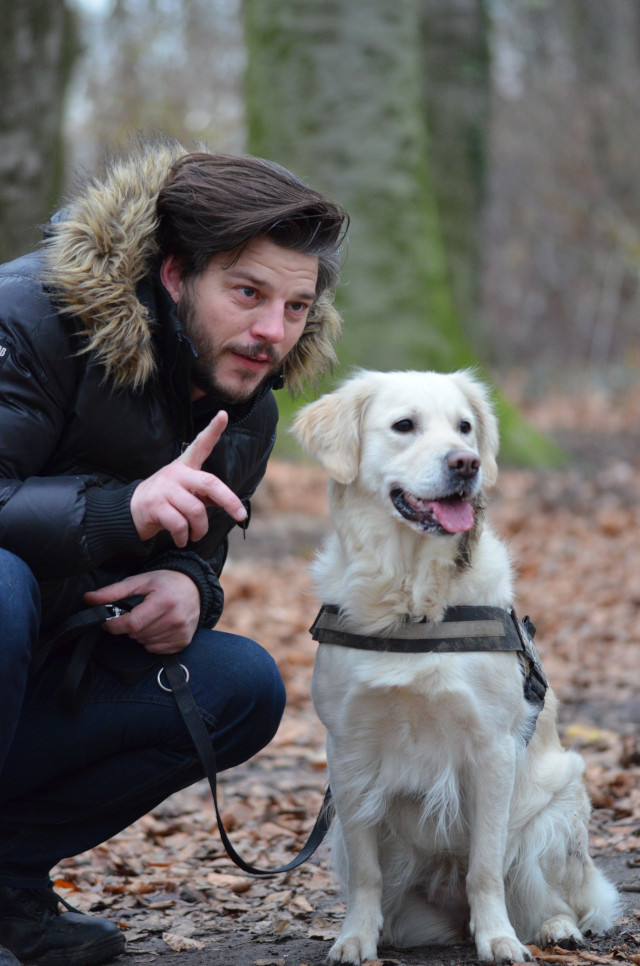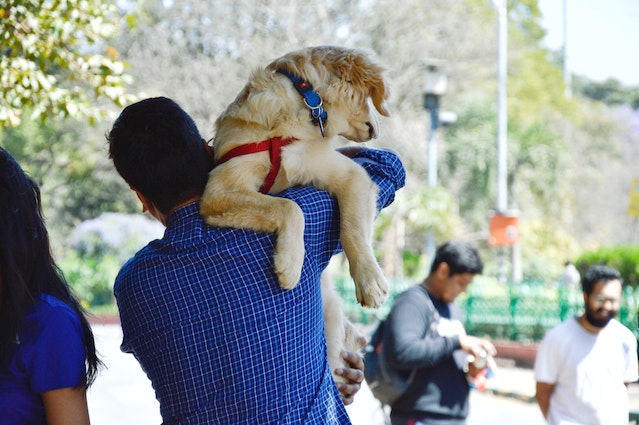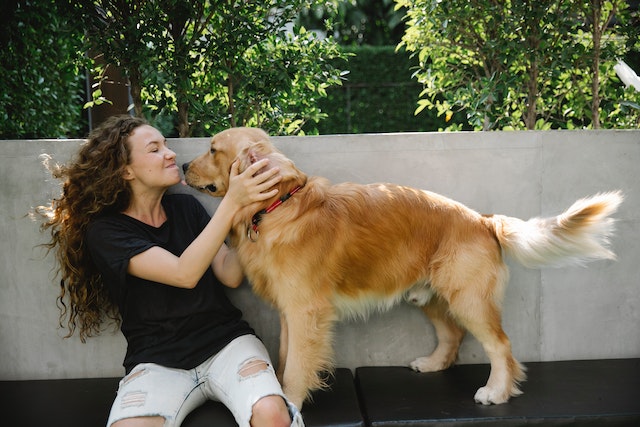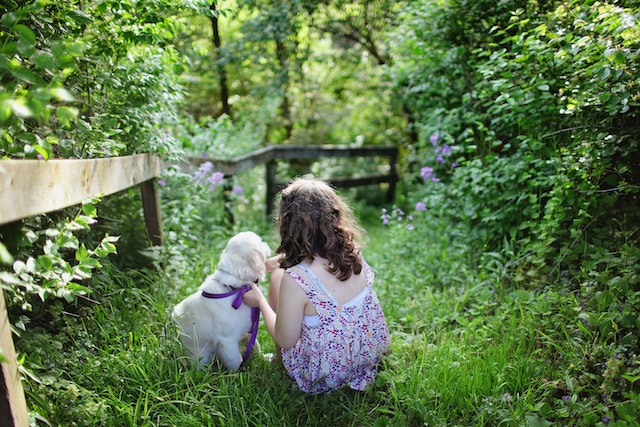Have you ever thought about getting a new golden retriever, either as a puppy or a mature dog, only to wonder whether or not they’re affectionate? Golden retrievers are undeniably large dogs, so with this thought in mind, it’s important to consider before buying your new canine companion whether they’re the right dogs for you.

This may have led you to wonder: are golden retrievers affectionate? Luckily, we’ve outlined some of the key things you need to know about golden retriever temperament to help inform your decision. Hopefully, this will allow you to decide whether these gorgeous dogs might be right for your home.
Contents
- Are Golden Retrievers Affectionate?
- Are All Golden Retrievers Affectionate?
- What Can Cause a Golden Retriever to be Less Affectionate?
- Handling
- Mistreatment
- Health
- Genetics
- Age
- What Do I Do If My Golden Retriever is Aggressive?
- What to do if a Golden Retriever Becomes Too Affectionate?
- #1 Address the Issue Quickly
- #2 Don’t Feed Your Dog Sugary Foods
- #3 Give Your Dog Somewhere to Calm Down
- #4 Don’t Encourage it!
- #5 Get Professional Behavioralist Support
- Final Thoughts
Are Golden Retrievers Affectionate?
Before getting a new dog, it’s worth considering their temperament to ensure they’re the right dog for you. Luckily, on the whole, golden retrievers are a very friendly and affectionate breed; as such, if you’re looking for a dog who will love you immensely, a golden retriever could be ideal.
Are All Golden Retrievers Affectionate?

Naturally, as with any breed, there are always individual variations in terms of affection. As such, while one golden retriever may be incredibly affectionate, its litter mate could be quieter and a little more reserved overall.
However, this isn’t necessarily bad since not everyone wants an incredibly friendly dog (and vice versa). For example, if you have a young child in your home, a slightly more laid-back golden retriever might be better for your family.
What Can Cause a Golden Retriever to be Less Affectionate?

There are numerous different reasons why your golden retriever might be less affectionate than some other retrievers. Some of the most common reasons why a golden retriever might be less friendly than you’re expecting could include:
Handling
If your new golden retriever has not been well handled, it may be quite shy and wary of people, especially new people. With this thought in mind, if you suspect your retriever has not been handled well, you should always take things slow and allow your pet to warm up to you in their own time. This strategy can help them adjust slowly without being afraid; it’s a slow process but one that can often reap dividends.
Mistreatment
If your dog has been handled in the wrong way by previous owners, they may be much less willing to spend time with you as well. This isn’t necessarily a reflection on your handling of them, but you may need to take it slow with your new golden retriever, in this case, while they learn that you are a friend and not going to mistreat them.
Health
Sometimes, a previously affectionate golden retriever can become substantially less cuddly and friendly, which may indicate a change in your dog’s health. If your dog is feeling unwell or is in pain, they can’t tell you directly, but cues such as behavioral changes may explain why they aren’t their normal, cuddly self. As such, if you notice that your dog isn’t acting like they normally do, it may be worth checking if it could be feeling unwell or in pain.
Genetics

Sometimes, your new golden retriever’s temperament can simply come down to their genetics. Indeed, certain bloodlines are especially placid and friendly. Others may not be as immediately friendly if you’re looking for an affectionate pet.
With this in mind, we always recommend you try to meet the parents of your new golden retriever, if possible, to ensure that the parents’ temperament is pleasant, as this may have some influence on the temperament of your new puppy when they grow up.
If buying or acquiring an older golden retriever, checking the parents’ temperament may be more difficult. However, if your new pet has pedigree papers, you may be able to find the parents’ names and find out more about the genetic temperament that way. However, when buying an older dog, you have the chance to spend a little more time getting to know it first, which may help.
Age
It’s also worth considering that your golden retriever’s nature and temperament may change with age. An older dog may be more tolerant of sitting still for cuddles than a younger puppy. However, they may similarly be less willing to seek out cuddles, which could represent a change with time. Thus, if your dog is a little older, it may explain why they have become less affectionate towards you over the last few months and years.

What Do I Do If My Golden Retriever is Aggressive?
If your golden retriever is starting to become aggressive, the most important thing is to determine why they are becoming aggressive. Often, the cause may be that your dog may feel pent up or frustrated, such as if they have been cooped up without adequate exercise. Always aim to walk your golden retriever regularly – retrievers are an active breed!
In addition, while golden retrievers are often very friendly towards people, a puppy that hasn’t spent much time with other dogs may also become aggressive (or defensive) when in the presence of its peers. This could lead to aggressive behaviors towards other dogs.
In these scenarios, it is important to correct the aggressive behavior as soon as possible. For example, letting your dog get away with aggressive behaviors may cause them to do so more often – compounding the problem accordingly!
However, it’s worth remembering again that golden retrievers, by their nature, are docile and patient dogs. So, if your retriever has developed an aggressive temperament, it may indicate an underlying issue (such as poor health, injury, or fear). Golden retrievers are rarely aggressive for no reason; a professional vet or behavioralist may be able to help you understand your dog’s behaviors better.
What to do if a Golden Retriever Becomes Too Affectionate?

As we’ve clarified at this point, a golden retriever may occasionally become aggressive if it isn’t handled properly and is afraid. However, in most cases, golden retrievers are exceptionally friendly dogs, but this can also pose another problem: when they become too friendly and are not easy to handle!
While we adore dogs here at Official Golden Retriever, we understand that the excitable nature of golden retrievers can sometimes become a little too much to handle. With this thought in mind, if you’ve been finding your beloved family pet has gotten too excitable, it’s worth considering steps you could take to calm them down.
#1 Address the Issue Quickly
One of the most important things to do if you notice that your golden retriever is becoming too affectionate and excitable is to address the behavior quickly. If your dog is allowed to carry on misbehaving, they may struggle to understand what they’re doing wrong down the line. Simple steps such as telling your dog to sit and stay when they begin to misbehave may help stop the behavior from worsening.
#2 Don’t Feed Your Dog Sugary Foods
Just as with little children, it’s absolutely possible for your dog to become hyper if they eat a high-sugar diet. As such, if you notice that your golden retriever’s temperament has become unusually overbearing and affectionate, it can be worth cutting out the treats and ensuring their diet is free from ingredients that could induce hyperactivity. Your vet may be able to help with this further!
#3 Give Your Dog Somewhere to Calm Down

Sometimes, an overly affectionate dog just needs somewhere to calm down. As such, ensuring your dog has somewhere they can go that’s theirs, such as a bed or a dog kennel, can be a great way to address overly excitable behavior.
#4 Don’t Encourage it!
If you’re not worried about your dog’s overly affectionate nature, it’s easy to encourage this by playing with the dog inadvertently. This tells your dog that their overly affectionate behavior is okay – and makes them more likely to do it when less confident people are around. As such, try not to have one rule for one and one rule for another. Keep things consistent to address your dog’s excessive affection!
#5 Get Professional Behavioralist Support
If you still can’t get your golden retriever to calm down, don’t panic; there are professionals whose job is to help with canine behavior! As such, if your dog is struggling to stay calm and it’s impacting your family life, you may want to get a canine behavioralist’s support to help.
A behavioralist may be able to help identify triggers for your pooch to get excited and can help you implement new strategies to keep them calm accordingly. You might just find that it’s an excellent way to overcome any challenges you’ve had with your golden retriever becoming too
Final Thoughts
If you’ve been looking to add a beloved new four-legged friend to your home, it’s worth considering if the golden retriever’s temperament might suit your lifestyle. Golden retrievers are incredibly friendly and affectionate, friendly dogs which often makes them very loveable.
However, if you have a small child in your home or someone who is afraid of dogs, their overburdening friendliness may come as a shock. Fortunately, golden retrievers are also incredibly intelligent, so it is possible to train your new pooch to be a little less excitable if needed.




